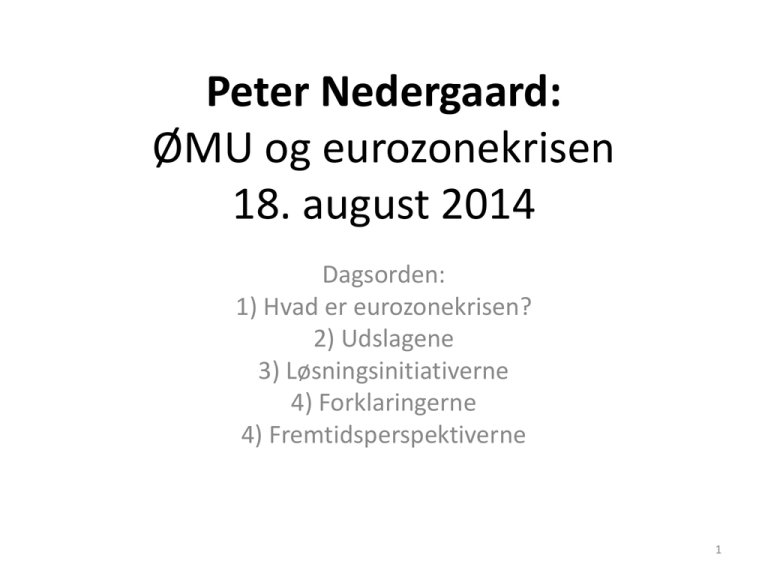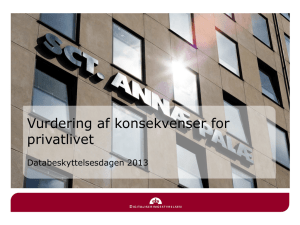Eurozonekrisen - Peter Nedergaard
advertisement

Peter Nedergaard: ØMU og eurozonekrisen 18. august 2014 Dagsorden: 1) Hvad er eurozonekrisen? 2) Udslagene 3) Løsningsinitiativerne 4) Forklaringerne 4) Fremtidsperspektiverne 1 Eurozonekrisen En gælds- og underskudskrise i eurozonen - Udløst af subprimekrisen/ Lehman Brothers krak - Men det var kun den udløsende faktor - Krisen var kommer senere alligevel Market failures eller government failures? 2 Indholdet af eurozonekrisen - Store underskud i visse lande pga. offentligt overforbrug eller manglende skatteopkrævning Tegn: - Boligboble - Forbrugsfest Konsekvenser: - Massearbejdsløshed - Lav økonomisk vækst 3 Demonstrationer 4 I begyndelsen stor forvirring 5 Finanspagten 1. Intergovernmental aftale – med institutionel EU-back up 2. Skærpelse af Vækst- og stabilitetspagten (QMV for sanktioner) 3. Finanspagten: QMV for at hindre sanktioner 4. Max. 3 pct. konjunkturbetinget underskud 5. Max. 0,5 pct. strukturelt underskud (ordoliberalismen) 6 The EU Replies to the Euro Crisis Time at agreement Initiative Purpose of the initiative at Fora of decision- Form of initiative Obstacles Temporary facility No bail-out clause making the EU level 2010 European Financial Loan to member Standing Facility states European Council in TFEU (Article (EFSF) 2011 Euro Plus Pact 123) Increase European Council competitiveness Intergovernmental The UK, the agreement Czech Republic, Sweden and Hungary abstained 2011 2011 European Semester Six Pack Monitor national European Supranational EU budgets Commission law Correction of European Supranational EU macro-economic Commission law imbalances and sanctions 7 The EU Replies to the Euro Crisis 2011 Buy government bonds Lower interest rates ECB Market intervention German in euro crisis Constitutional countries Court might declare plans illegal (cf. Article 123 in TFEU) 2012 European Stability Loan to member Mechanism (ESM) states European Council Intergovernmental The UK, the institution Czech Republic, Sweden and Hungary abstained 2012 Fiscal Compact Fiscal discipline European Council Intergovernmental The UK and the treaty Czech Republic abstained 2013 2013 Two Pack Banking Union Surveillance European Supranational EU mechanisms Commission law Banking supervisory European ECB supervisory Some non-euro authority body countries will Commission abstain (e.g. the 8 UK and Sweden) Teoretiske forklaringer på eurozonekrisen Euro crisis Cause of the political initiatives for the solution to the Solution to the euro crisis Theory Neo-functionalism euro crisis The proposals for closer economic integration and The Fiscal Compact and further tightening of EMU coordination did not come until some time into the thereby complete the spill-over process and eliminate crisis in 2011, when there was an urgent need to ease the initial design flaw. the pressure on the interest rates in crisis countries. Intergovernmentalism As the leader of the EU Germany accepted the Euro crisis gives Germany an incentive to assume the establishment of EMU to ensure a stable EU, which role of hegemon, but a solution requires other EU is a German interest. It has been an active leader member states to agree to Germany playing this role. from 2011 and onwards, when the euro crisis began to affect important German economic and political interests. Ordo-liberalism Germany assesses the 2011 situation and concludes The decision-makers of the euro countries adjust that the EMU needs a dose of ordo-liberalism in the institutions as well as their way of thinking in form of monetary stability, zero-tolerance towards accordance with the German model. Ordo-liberalism public deficits and effective sanctions embedded in a assumes complete ideological hegemony and is form of economic constitution. internalised at the decision-making level in the9 euro area. Prognoser angående en permanent løsning på eurozonekrisen Prognoses Prognosis regarding the solution to the euro crisis: positive or negative? Theory Neo-functionalism Positive: Once the EU has corrected the design flaws of the EMU through tightened rules, the euro crisis will be solved. Intergovernmentalis Positive/ negative: The other euro countries have to accept the hegemon m role of Germany and the German population has to accept the costs of playing the role of the leader. Ordo-liberalism Negative: Ideology and institutions are not easily changed into an ordoliberal model. 10 Faldende tilslutning til det europæiske projekt 11 Mistillid til nationale politske ledere (undtagen Merkel) 12 Mistillid til hinanden? 13 Opsamling •EU har betalt en høj pris for ikke at centralisere den økonomisk-politiske beslutningstagen 1.I første omgang så der ikke ud til at være nogen pris at betale 2.Kommissionen var samtidig tøvende med at tilslutte sig den funktionalistiske argumentation 3.Kommissionen fra 2010: Gennemgang af finanslove om foråret, før de vedtages om efteråret + europagten i 2011: Offentlige lønninger, pensioner, produktivitet, konkurrenceevne. 4.Kommissionen styrer de factor finanspolitikken i Grækenland 5.Finanspagten 14
